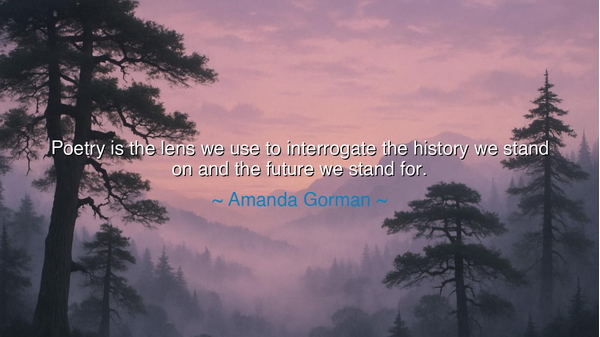
Poetry is the lens we use to interrogate the history we stand on
Poetry is the lens we use to interrogate the history we stand on and the future we stand for.






"Poetry is the lens we use to interrogate the history we stand on and the future we stand for." These profound words by Amanda Gorman remind us that poetry is not merely the art of weaving beautiful words, but a powerful tool through which we examine the past and shape the future. Just as the lens of a microscope allows us to see the intricate details of the unseen, so does poetry reveal the truths of our collective history and the promises of what is yet to come. Poetry transcends the limitations of mere fact; it pierces through the veil of everyday existence, offering us a vision of life that is both timeless and urgent. Through language and emotion, poetry asks us to confront the weight of history and consider the kind of world we are building for those who will come after us.
In the ancient world, the great poets were not just artists, but sages—Homer, Sophocles, and Virgil used their words not only to tell stories, but to reflect the human condition, to interrogate the forces that shaped the present and to warn or inspire the future. Homer’s Iliad and Odyssey were not just epic tales of heroism and adventure, but reflections on the nature of war, honor, and the consequences of pride. The Greek chorus, often an important element in ancient drama, served as a voice of the people, reflecting upon the actions of heroes and gods alike, questioning the motives behind their deeds, and offering lessons for future generations. Poetry, in this sense, was a mirror of society, a tool for reflection and guidance, shaping the moral compass of an entire culture.
Amanda Gorman’s words are akin to the wisdom of these ancient poets. Poetry allows us to examine history, not just as a series of dates and events, but as the story of the human spirit—its triumphs, its tragedies, and its continuous striving for something better. In the same way, the poet’s pen is a tool of inquiry, helping us to ask difficult questions about the world around us. What have we learned from the past? What injustices still linger? What dreams must we fight for? These questions are often too complex for simple answers, but poetry—through its beauty and power—opens the door to understanding. The words of poets like Langston Hughes, Maya Angelou, and Walt Whitman have helped illuminate societal struggles and visions of hope, giving voice to the oppressed and inspiring movements of change.
Consider the example of Martin Luther King Jr., whose words, though not traditionally classified as poetry, carried the same weight and beauty. His “I Have a Dream” speech became an anthem for the civil rights movement, a poetic vision of a future where freedom and equality are realized for all people. King, like a poet, used the language of hope and justice to interrogate the history of racial oppression and to offer a vision for the future—one that was bold, compassionate, and full of possibility. His speech, much like poetry, continues to resonate because it does not merely tell us what is, but shows us what could be—a world where justice and love transcend division and hate.
Gorman’s work—especially her iconic performance at the inauguration of President Joe Biden—follows in this tradition. Her poem, "The Hill We Climb," calls upon the collective conscience of a nation to face its troubled past while pushing for a future marked by unity and understanding. She speaks of hope, yes, but she also acknowledges struggle, division, and imperfection. Poetry, in this case, becomes the lens through which we see both the scars of our history and the promise of what is possible. It calls upon us to not only recognize where we stand but to question what we stand for.
The lesson of Gorman’s quote is clear: poetry is not merely the expression of the soul; it is the interrogation of our lives, our histories, and our dreams. It asks us to look at the world with clarity, to ask difficult questions, and to imagine a future that transcends the limitations of the present. Just as the great poets of the past used their words to challenge and shape their world, we too can use poetry—or any form of creative expression—to shape our understanding of history and our vision for the future.
Therefore, let us not shy away from using the lens of poetry to interrogate our own lives, our society, and our collective future. Let us ask the difficult questions, face the painful truths, and dream boldly for the future we wish to create. For, as Amanda Gorman reminds us, poetry is not just a reflection of what is; it is a guide for what can be. It is a call to action, a call to both acknowledge where we have been and to envision where we can go. Let us answer that call with courage, compassion, and a shared commitment to a better world.






AAdministratorAdministrator
Welcome, honored guests. Please leave a comment, we will respond soon